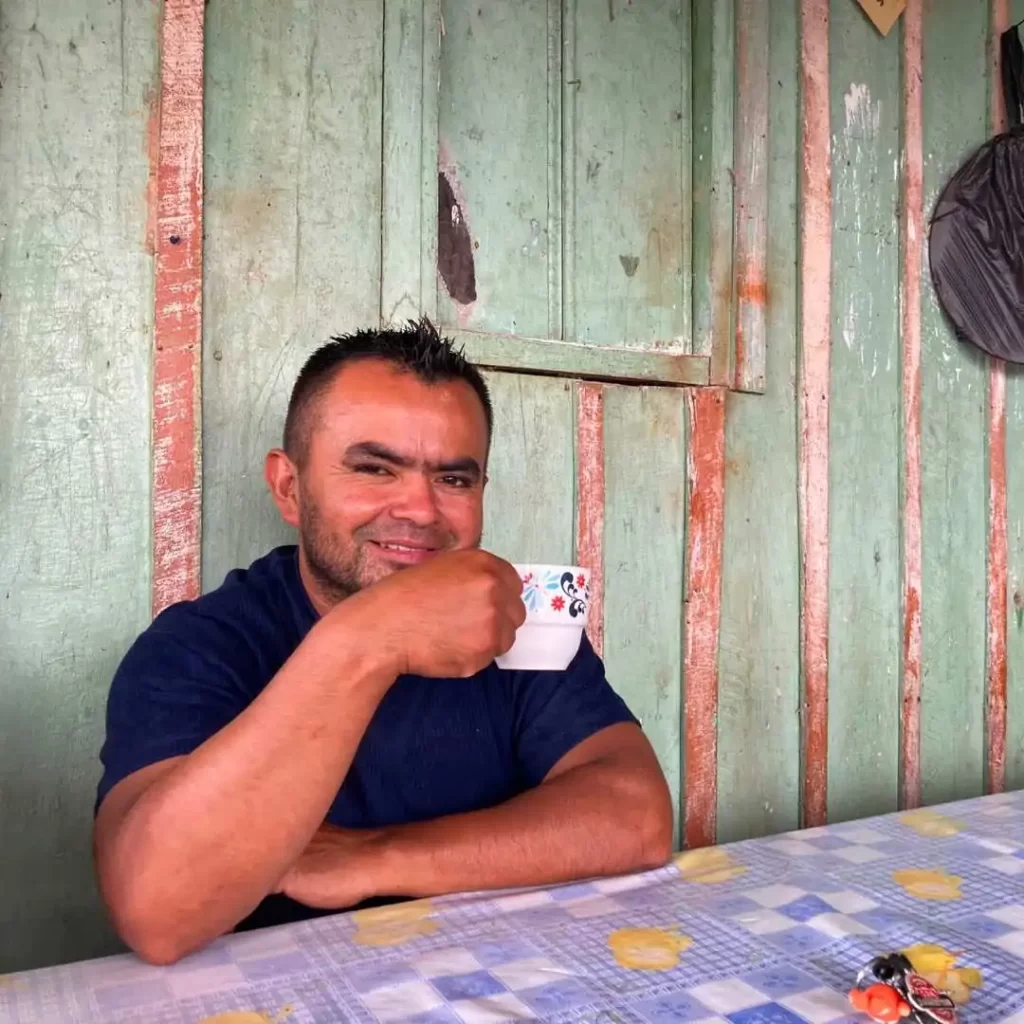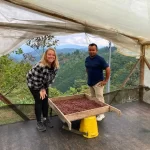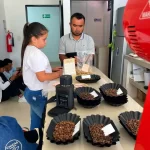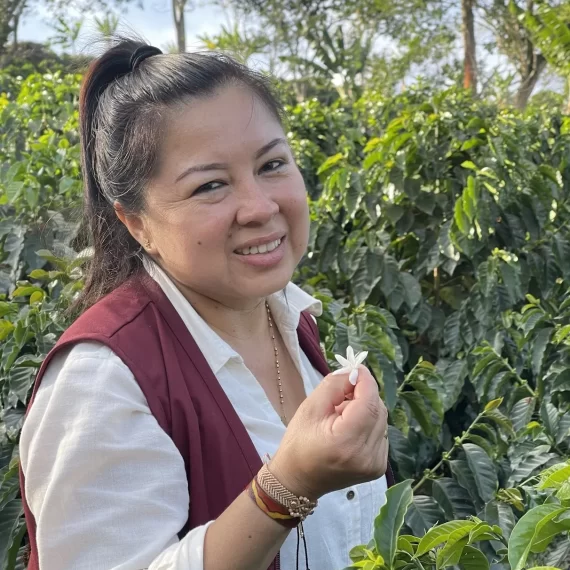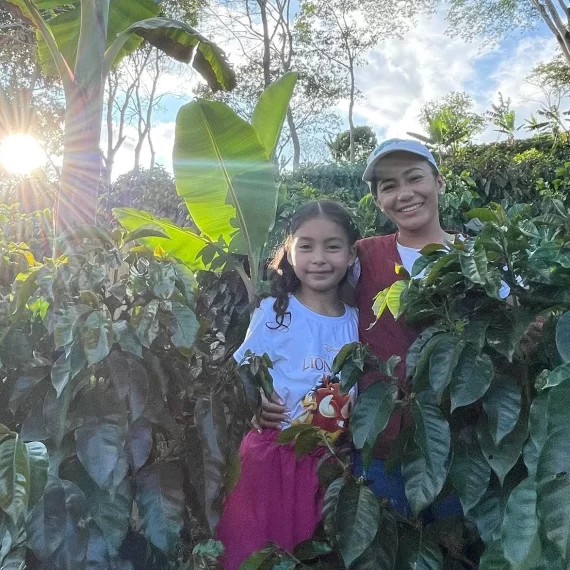
La Cabaña
Under this profile we would like to introduce you to the family farm La Cabaña and with it Libardo and William Ortiz. All the Ortiz family are coffee farmers and they are divine. It all started with Libardo Ortiz’s father, the grandfather of the clan. Coffee farming was then taken over by Libardo Ortiz, a super gentleman who leads all his children to love coffee. We at Chicas started a few years ago by working with William Ortiz, one of his sons, and have gradually expanded our shopping list to include other coffees, both from Mr. Libardo and his other son Julian. Each of them has a slightly different approach to coffee and we enjoy it immensely.
William is a representative of the third generation of coffee farmers. Since childhood, he has been surrounded by coffee and has known everything about the coffee cultivation process—from selecting beans, germinating them, planting them on the plantation, to growing them to their full potential. At the age of 15, he attended his first courses on coffee production and began to take an interest in specialty coffee cultivation. He continues to participate in courses and training because improving the coffee’s flavor profile has always been his priority. This led him to focus on various fermentation processes.
Bit by bit, with great effort and determination, William is starting to see the results. He now takes care of his own coffee plants, which has given him the freedom to experiment with new fermentation processes. As a result, he has achieved better flavor profiles and is currently working on standardizing fermentation processes.
The farm
The farm is breathtaking. Nestled in the hills, it stands in solitude with panoramic views in all directions, where the surrounding towns and villages appear as if seen from an airplane.
The farm has been in the family for two generations. The family moved to the area and began growing coffee around 1965. Since 2009, they have owned this specific farm, which also serves as their home. Currently, farming is a joint effort of William, his brother Julian, and their parents. With dedication and teamwork, they have achieved secondary technical education in coffee production while simultaneously working and farming together.
Gradually, younger generations of Ortiz family, such as William’s daughter, are getting into farming and working with coffee. She is most interested in coffee preparation and tasting, so she profiles herself as a bassist and professional “cupper”. Over the years, William’s mother has also been given the space to raise the profile of her own efforts – she has joined the Asogloriellas association and some of the coffee from the farm is processed under her supervision and sold under her name. A small thing, but still rather a dream for most women in Colombia.
About the coffee
William is a passionate enthusiast and an experimenter at heart. With great determination, he delves into lactic and carbonic fermentations, drawing inspiration from social media and training sessions. Why does he do it all? Because he loves it, but also to bring out the best in the coffees grown on the family farm. His favorite method is fermentation with added microorganisms, specifically lactic acid bacteria. However, he also works with washed processes. Step by step, he’s diving into competitions with his coffees—and we’re diving right alongside him.
Libardo, on the other hand, is a traditionalist, a lover of pure flavors and classic washed coffees—coffees that no one ever seems to tire of and that never go out of style. He doesn’t venture much into experimental methods. Libardo represents the older generation of farmers, the ones behind our beloved “washed coffees,” and we adore him for it.
The coffee cherry processing begins with a meticulous harvest carried out by our dedicated helpers. Their task is to ensure that only ripe cherries are picked—a crucial step for the success of the entire process. Thanks to their precision, we can achieve an 80% success rate in our specialized processing methods right from the start.
After harvesting, the coffee cherries are mechanically depulped and left in concrete tanks for 36 hours in a dry anaerobic environment. This step is vital for the development of flavors and aromas.
Following fermentation, the beans are washed only once, allowing some pulp to remain on them, which adds more sugars to the beans. The beans are then moved to the drying area, where the drying process takes place. The entire process happens on the Finca la Cabaña farm and takes approximately 15 days. During fermentation, nothing but drinking water is added, ensuring the resulting coffee flavor remains pure and authentic.
The coffee cherry processing begins with a meticulous harvest carried out by our dedicated helpers. Their task is to ensure that only ripe cherries are picked, a crucial step for the success of the entire process. Thanks to their precision, we can secure an 80% success rate in our specialized processes right from the start.
After harvesting, the coffee cherries are mechanically depulped and placed in concrete tanks for 36 hours in a dry anaerobic environment. This step plays a key role in the development of the coffee’s flavors and aromas.
Following fermentation, the beans are washed three times and then moved to the drying area. The entire process takes place on the Finca la Cabaña farm and lasts approximately 15 days. During fermentation, nothing but drinking water is added, ensuring the coffee’s final flavor remains pure and authentic.
This lot is a blend of Colombia, Caturra, and Castillo varieties, traditional varieties grown in Colombia. The coffee was cultivated on the La Cabaña farm. The processing steps are as follows:
- Harvesting coffee cherries at their optimal ripeness
- Floating and disinfecting the cherries
- Anaerobic fermentation in tanks or bags for 40 to 60 hours
- Separation of lixiviates and subsequent drying in rooftop drying beds for approximately 21 days
This lot comes from the La Cabaña farm and features the Pink Bourbon variety, processed using the natural method. The processing steps included:
- Harvesting coffee cherries at their optimal ripeness
- Floating and disinfecting the cherries
- Oxidation for 36 hours
- Anaerobic fermentation for 60 hours
- Submerged fermentation for approximately 60 hours
- Separation of lixiviates and subsequent drying on a solar drying bed for approximately 21 days


